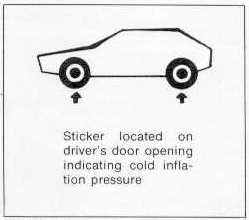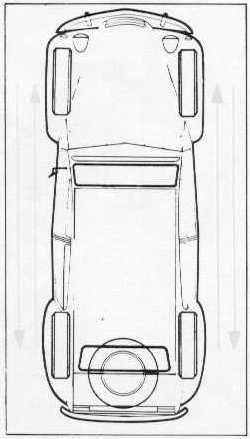
Fig. 39 - Tyre
pressure

Fig. 39a - Tyre
rotation |
| Periodic
maintenance operations |
|
These are indicated in the Maintenance
Guide", which accompanies this manual. We would recommend you
to adhere to the frequencies indicated and would remind you that we
recommend "TOTAL" lubricants.
All mixtures and experiments are forbidden, and, in particular,
the use of oil additives of any kind, as these may lead to serious
trouble.
Never grease or lubricate the rubber mounted link situated under
the bonnet, above the gear change lever. Never grease or lubricate
the gear change lever.
|
| Standard
equipment |
Authorized
alternatives |
Pressures
|
| FRONT
|
REAR
|
SPARE
|
| 125-15X |
135-15X |
1.4 bar (20 psi) |
1.8 bar (26 psi) |
2 bar (29 psi) |
| |
125-15X (M + S) |
1.4 bar (20 psi) |
1.8 bar (26 psi) |
2 bar (29 psi) |
| |
135-15X (M + S) |
1.4 bar (20 psi) |
1.8 bar (26 psi) |
2 bar (29 psi) |
| |
135-15ZX |
1.4 bar (20 psi) |
1.8 bar (26 psi) |
2 bar (29 psi) |
| * Tubeless or not: depending
on equipment. |
- These pressures apply to laden or
empty vehicles, on roads or motorways whatever the speed.
On authorized series 135-15ZX, the pressures should be modified
in certain cases: on stony tracks, 1.6 bar (23 psi) at the
front; in sandy conditions, 1.0 bar (14.5 psi), front and rear.
- Tyre pressures must be checked when
the tyres are "cold". A cold tyre is one that has not
been driven for at least an hour, or that has been driven for 2
or 3 km max. at low speed.
- Do not forget to check the pressure of
the spare wheel.
- The pressure increases when the car is
running; never deflate heated tyres.
- When checking heated tyres, the
pressure should exceed by 0.3 bars (4.35 psi) approx. those
recommended for "cold" tyres - (1 bar = 1kg/sq. cm).
- Changing the wheels round evens out
the wear on the tyres. We advise you to carry out this operation
every 20,000 km (12,000 miles). Follow the diagram opposite.
Correct the pressures afterwards.
- Keep a check on wheel balancing,
especially after a puncture.
- Changing the wheel is described on
page 30.
Do not use tyres other than those we
recommended. |
| UNDERINFLATED
TYRES = DANGER |
|

